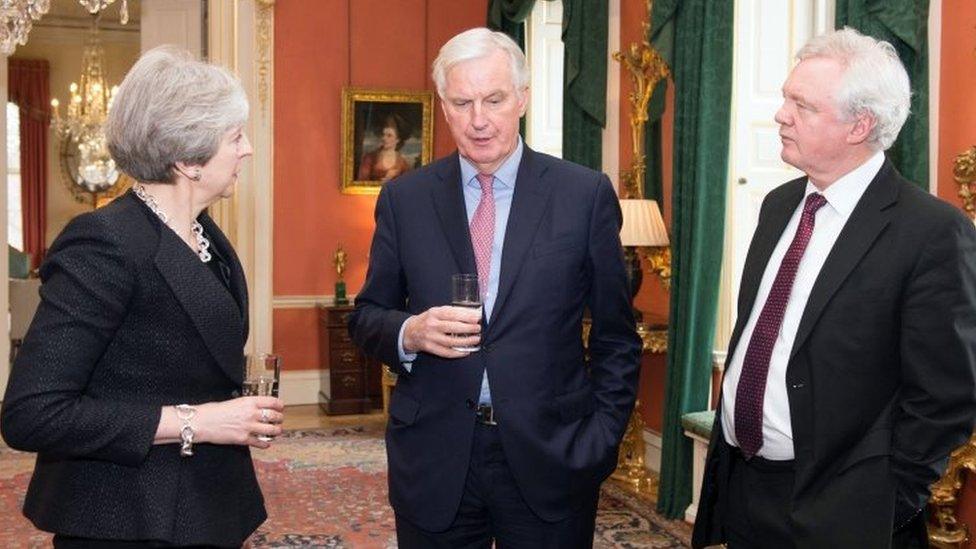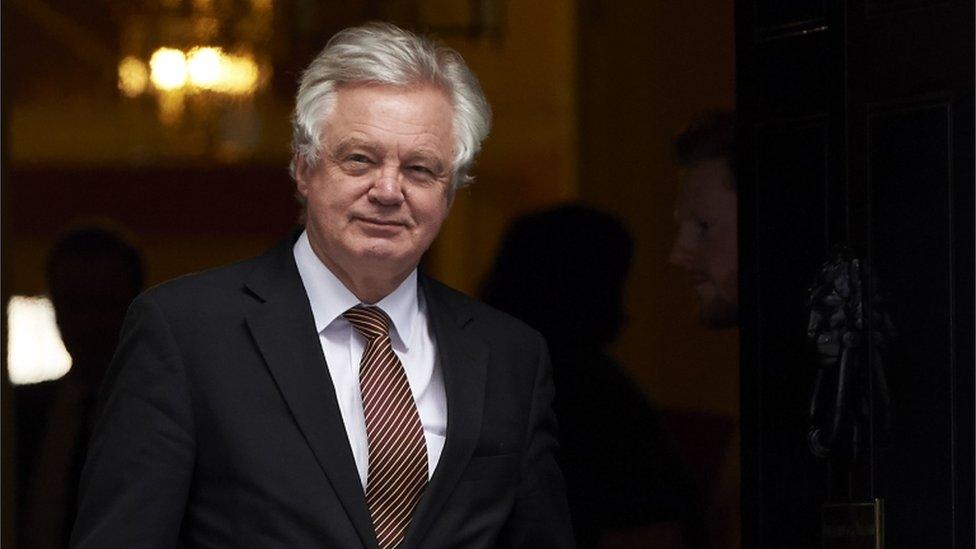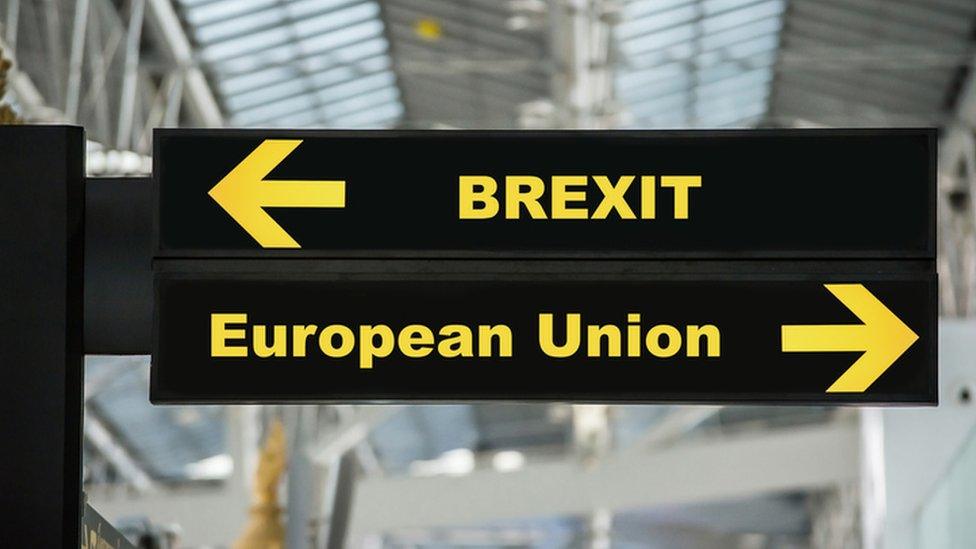Brexit: Transition period not 'a given', says Barnier
- Published
- comments
Key points of Michel Barnier's news briefing
EU Brexit negotiator Michel Barnier has warned that a transition period immediately after Brexit in 2019 is "not a given".
He said "substantial" disagreements remained and he had "some problems understanding the UK's position".
And he said the UK decision to quit the customs union and single market meant Irish border checks were "unavoidable".
David Davis said he was "surprised" to hear Mr Barnier was unclear on the UK's stance on the transition period.
"We are seeking a time-limited period that maintains access to each other's markets on existing terms," said the UK's chief Brexit negotiator.
He suggested there was a "fundamental contradiction" in the approach the European Commission was taking to Brexit talks.
"Today they acknowledged that a way to resolve disputes and infringements is needed.
"Yet at the same time they dismissed the UK's push for reasonable safeguards to ensure our interests are protected. It is not possible to have it both ways."
Mr Davis says businesses need "about two years" with much the same trading rules as they have now to allow them to adjust after the UK leaves the EU on 29 March next year.
And he had hoped to get a deal with the EU on it by this March, so talks could then move on to the bigger issue of the UK's future relationship with the remaining 27 EU nations.
But Mr Barnier, speaking after a week of technical discussions between civil servants on both sides, said that three "substantial" disagreements remained over the transition period.
The pound fell sharply against the dollar and the euro during Mr Barnier's speech before recovering slightly to stand about 0.7% down on the day.
The main sticking points
The UK's refusal to guarantee permanent rights to EU nationals who come to live and work in Britain during the transition period
The right of the UK to object to new EU rules and laws during the period
Whether the UK could continue to participate in new justice and home affairs policies during the transition period.
"To be frank, I am surprised by these disagreements. The positions of the EU are very logical, I think," said Mr Barnier.
He said the UK must "accept the ineluctable consequences of its decision to leave the EU, to leave its institutions and its policies".
"If these disagreements persist the transition is not a given."
Barnier's message to British negotiators

By BBC Political Correspondent Leila Nathoo
This was a politely delivered but pointed message to Britain: you can't keep up your cake-and-eat-it approach of vowing to leave the single market and customs union while still wanting no checks at the Irish border.
And don't bank on a transition period (which was supposed to be the easy bit to agree) as there's still plenty we don't see eye-to-eye on.
Theresa May has been keeping the government's position deliberately vague as her ministers struggle to agree among themselves on exactly how they see Britain's future ties with the EU.
But the bottom line from Brussels today? Time to talk straight and put flesh on the bones.
Labour blames 'cabinet in-fighting'
Labour's Shadow Brexit Secretary Sir Keir Starmer said the prime minister should take immediate action to avoid a "cliff-edge" for business.
"Theresa May must end the infighting within her cabinet, drop her reckless redlines and accept Labour's proposals for a transitional deal.
"That means seeking to remain in a customs union with the EU and within the single market during that period."
Lib Dem leader Sir Vince Cable, who wants a referendum on any final deal with the EU, said the government "has no plan, no strategy, and no idea".
But Northern Ireland's Democratic Unionist Party, which supports Theresa May's minority government, accused Mr Barnier of "brandishing the threat of customs controls" when "everyone has committed to avoiding a hard border".
They argued that the best solution was to resolve the issue through a free trade agreement and "fresh customs partnership with Brussels".
Courtesy row: Davis v Barnier
Mr Barnier hit back at comments by David Davis, who described a leaked EU document suggesting any dispute with the UK during the transition period could mean UK benefits, such as access to the single market, being suspended as "frankly discourteous".
The EU negotiator said he had "not been in the least discourteous or vindictive" adding: "Quite simply we have to construct a withdrawal agreement which is legally sound and does not give rise to any uncertainty in anyone's mind."
Is a hard Irish border 'inevitable'?
Ireland's Europe minister tells Today they need proposals from UK on Irish border post-Brexit
On the thorny issue of the border between the Irish Republic and Northern Ireland, Mr Barnier said there was agreement that a hard border must be avoided, but added: "It is important to tell the truth.
"A UK decision to leave the single market and to leave the customs union would make border checks unavoidable."
Prime Minister Theresa May has said the UK will leave the single market and the customs union, although she has yet to spell out in detail what she wants instead.
She secured an agreement on withdrawal - including avoiding the return of a hard Irish border - in December.
But that has now got to be translated into a legal text before it can be ratified by the EU - and Mr Barnier said he wanted to get rid of any ambiguity on the Irish border question.
The withdrawal agreement includes a fall back position if the UK leaves without a deal, which proposes "full regulatory alignment" with the EU.
To some this sounds like staying in the single market and customs union - but other options, preferred by the UK, to avoid border checks are still on the table.
Mr Barnier said the UK has accepted the need to discus how to make "full regulatory alignment" work in practice, while the other options are discussed in parallel.
But he added: "Time is short - very short - and we haven't a minute to lose if we want to succeed. And we do want to succeed in this orderly withdrawal."
- Published8 February 2018

- Published1 February 2018
